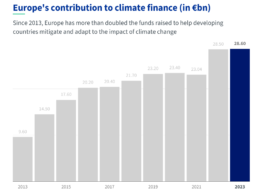A recent report reveals that more than 30 countries collectively reduced public funding for overseas fossil fuel projects by up to $15 billion last year, though the United States continued to invest billions in oil and gas financing.
At the 2021 COP26 UN climate change conference in Glasgow, countries including the US, Canada, the UK, and France committed to redirecting as much as $28 billion of annual trade and development funds from fossil fuels to clean energy. The countries, forming the Clean Energy Transition Partnership (CETP), succeeded in cutting such financing by $10 billion to $15 billion, bringing the total down to $5.2 billion in 2023, the first year of the scheme’s implementation. This represents a reduction of up to two-thirds compared with the 2019-2021 average, according to a report by the International Institute for Sustainable Development (IISD).
However, the report, published on Wednesday, noted that this reduction in fossil fuel funding was not matched by a significant increase in clean energy investment. Funding for clean energy rose by only 16% last year, reaching $21.3 billion compared to the 2019-2021 baseline. Adam McGibbon, a co-author of the report, criticised wealthy countries for not “scaling up clean energy finance fast enough.”
The initiative primarily targets export credit agencies, which traditionally offer low-cost loans and insurance to companies engaging in overseas trade. McGibbon explained, “[Previously] If I was a fossil fuel company in the UK and I wanted to export gas turbines to Iraq, but thought it was a bit risky, the UK government would step in and offer insurance and a loan at below market rates to help do that transaction,” he added. “They also directly finance [oil and gas] production as well. It tends to be across the whole fossil fuel value chain.”
The IISD report highlighted that export finance agencies within the Organization for Economic Co-operation and Development (OECD) governments are an even more significant source of energy financing than multilateral development banks. The UK, France, and Canada were identified as among the most diligent in fulfilling their pledges. The UK’s export credit agency, UK Export Finance (UKEF), notably reduced its fossil fuel transactions from $11.3 billion to zero between 2010 and 2020, having previously allocated over 99% of its energy financing to fossil fuels.
Conversely, the US, the largest member of the CETP, was the biggest violator of the commitment, providing $3.2 billion for 10 fossil fuel projects overseas last year. The US Export-Import Bank has also recently approved financing for six major projects, including $500 million to develop 300 oil and gas wells in Bahrain, and is considering financing projects in Guyana, Papua New Guinea, and Mozambique. Switzerland, Italy, Germany, and the Netherlands also failed to fully adhere to the pledge.
According to the OECD’s fossil fuel subsidy tracker, the US provided $12 billion in domestic subsidies to its oil and gas companies in 2022. McGibbon expressed disappointment in the US for failing to honour its pledge, particularly given President Joe Biden’s early 2021 executive order to phase out export finance for fossil fuels.
The OECD group of developed countries is now working to establish a binding commitment to end $41 billion of annual export finance for oil and gas, which would also include contributions from Japan and South Korea. While the US has not yet declared its stance in these negotiations, McGibbon noted that the trend of decreasing fossil fuel financing appears to be set.






















